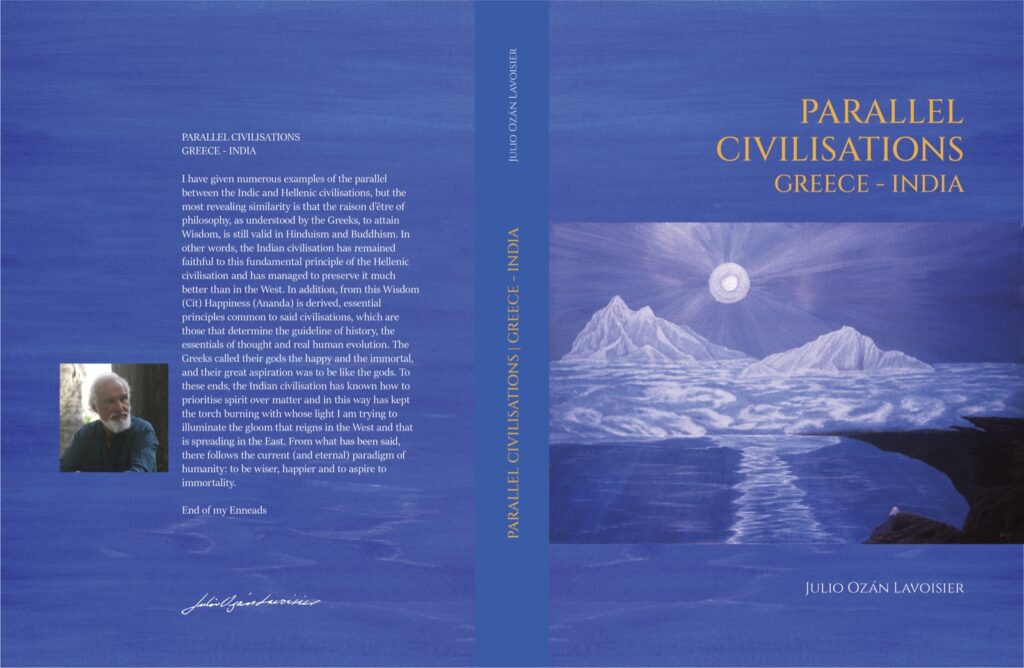Strange fate that of human being who seeks his reality in time and space, always projected in the beyond, since his destiny is here.
Inicio » PARALLEL CIVILISATIONS GREECE – INDIA
PARALLEL CIVILISATIONS GREECE - INDIA
Publisher: Motilal Banarsidass, New Delhi, India. 2024
The Indic civilization, basically, is the result of the succession and interaction of two traditions: Buddhist and Hindu; this is one of the traditions I will deal with in this treatise. The other civilization I will deal with is the Hellenic. I think the parallel between them sums up the essence of the Indo-European spirit. And I am convinced that in that spirit, which is expressed in Eastern and Western idealism, which I try to make converge in my philosophy, the most decisive answers can be found for the universal culture that begin with the new millennium.

Publisher: Motilal Banarsidass, New Delhi, India.
PART 1: THE ORIGIN
INDEX
Prologue
The Purpose of this Book
Synthesis from the First Principles
On Understanding
The Meaning of Myths
The Myth in Plato
Why Mircea Eliade?
On Mircea Eliade
The Origin of Time
Time and Divinity
Beyond Eliade
Myths and Universal Consciousness
My View of the Subject
Vital Plane and Evolution
Myths in the Present
On Initiations
Mythology and Philosophy
Mythical and Unitive Mentality
Schelling’s Philosophy of Mythology
Epistemological clarification
Conclusion
PART 2: GREECE AND INDIA
INDEX
GREECE
The Myth of Ariel
The Greek Spirit and Religion
The Greek Gods
Greek Art
Virtues of Polytheism
Religion and Nature
Circular and Linear Vision
The Cyclical Vision of Time
THE GREEK VIRTUES
Equilibrium
Heroism and Temperance
On Life and Death
The Social Being
The Universal Being
Pericles
The Greek Miracle
Hadrian
Conclusion
ON THE GREEKS AND HINDUS
On Greek and Hindu Myths
Genesis in India
Parallels in the Epic and Myths
Dark and Luminous Gods
Dionysus and Apollo
The Heroic Sense of Life in Greece
The Heroic Sense of Life in India
The Greek Tragedy
Pilgrimages and Festivals in Greece
Pilgrimages and Festivals in India
Similitudes in Religious Architecture
Other Similitudes
PHILOSOPHICAL CONCLUSIONS
Plotinus and the Indian Doctrines
On Life and Happiness
On Beauty
The Search for Unity
PART 3: THE INDIC CIVILISATION
INDEX
PRELIMINARY IDEAS
The Medieval Era in Europe and in India
Christianity and Civilisation
The Latent Force of Unity
Neoplatonism and Christianity
Indic Thought and my Philosophy
On Monotheism and Polytheism
On Monism and Dualism
The Philosophical Bases
On Psychology
On the Evolution of Consciousness
On Philosophy of History
On Ideas, Knowledge and Life
A Sketch of the Universus
Synthesis of my Proposal
BUDDHISM AND HINDUISM
The Unity of Dhamma and Dharma
On understanding Dhamma and Dharma
On Buddhism and Hinduism
Buddhism in the History of the Indic Civilisation
Buddhist Culture in the Indic Civilisation
Perspectives in the East and West
The Evolution of the Spirit in Hinduism
The Evolution of the Spirit in Buddhism
PART 4: HINDUISM
INDEX
The Vedas
The Heritage of the Vedas
The Decline of the Vedas
A Crucial Time
After the Vedas
Samkhya and Hinduism
The Gunas in Facts
The Gunas in History
Yoga, an Introduction
On Knowledge in Patanjali
Patanjali’s God
Patanjali and my vision
Introduction to the Upanishads
The Aitareya Upanishad
The Prasna Upanishad
The Mandukya Upanishad
The Kena Upanishad
The Isha Upanishad
The Mundaka Upanishad
The Bhagavat-Gita, an introduction
The Gita
Karma Yoga in the Gita
The wisdom of the Gita
On the Danger of Sentiments
Intellectual, devout and animal
The Brahma Sutras
Shankara
Shankara and the Taittiriya Upanishad
The Vivekacudamani
Ramanuja
Ramanuja and the Brahma-Sutras
Aurobindo and the Isha Upanishad
GENERAL COMMENTARY
On Spirit and matter
On the Observer
On the Atman
On Revelation
On Spiritual Techniques
On the Mind and the Yoga’s
On the Powers
On Reincarnation and Karma
On the Inner Plane
On Maya
On the Limits of Transcendental Knowledge
Vital Idealism
CONCLUSION
EPILOGUE

